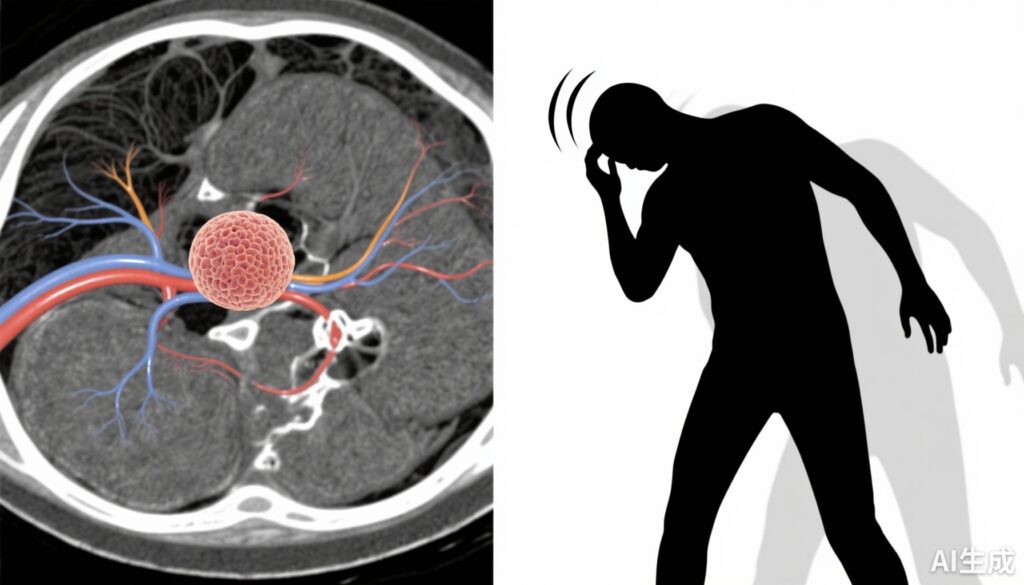Highlight
1. Anxiety correlates significantly with higher dizziness severity in patients diagnosed with vestibular schwannoma (VS).
2. Each point increase in anxiety severity (GAD-7 score) corresponds to a clinically meaningful rise in dizziness handicap (DHI score).
3. Psychological factors might influence symptom perception and burden in VS beyond direct tumor effects.
4. Integrating mental health assessment could improve holistic care for VS patients experiencing dizziness.
Study Background and Disease Burden
Vestibular schwannoma (VS), also known as acoustic neuroma, is a benign, typically slow-growing tumor arising from Schwann cells of the vestibulocochlear nerve. Patients commonly present with hearing loss, tinnitus, and dizziness—complaints that significantly impair quality of life. While hearing loss and tinnitus have been extensively studied, the determinants and characteristics of dizziness in VS remain less well understood. Dizziness can include vertigo, imbalance, or subjective unsteadiness, all contributing to disability and fall risk. Psychological factors such as anxiety are prevalent in chronic neurological conditions and may modulate symptom perception and severity. Identifying factors associated with dizziness could inform better symptom management and personalized care strategies.
Study Design
This retrospective cohort study analyzed data from 109 adults with radiologically confirmed VS at Washington University (St Louis, Missouri) from June 2004 to January 2025. All included patients completed vestibular function testing and scored their dizziness handicap using the Dizziness Handicap Inventory (DHI), a validated self-reported questionnaire assessing the physical, emotional, and functional impact of dizziness. Anxiety was quantified using the Generalized Anxiety Disorder-7 (GAD-7) scale and by documented history of anxiety disorders. The primary outcome was the severity of dizziness, operationalized as the continuous DHI score. Multivariate analyses adjusted for potential confounders to determine independent associations between anxiety measures and dizziness severity.
Key Findings
The cohort’s mean age was 61 years (SD 14), with 52% female. The mean DHI score was 27 (SD 24), indicating mild to moderate dizziness handicap on average but with wide variability. Patients reporting a history of anxiety had significantly higher mean DHI scores by 13.7 points (95% CI, 4.2 to 23.2), reflecting greater dizziness severity. Notably, for each incremental point increase in anxiety severity measured by GAD-7, the DHI score rose by 2.6 points (95% CI, 2.0 to 3.3), suggesting a dose-dependent relationship. After adjusting for covariates such as age, sex, tumor size, and hearing loss, the association persisted with a 1.9-point increase in DHI per GAD-7 point (95% CI, 1.3 to 2.6). On average, anxiety history was independently linked with a 10.6-point greater dizziness handicap (95% CI, 2.4 to 18.7). These findings underscore a robust association between anxiety and subjective dizziness burden in VS patients.
Expert Commentary
This study adds compelling evidence to the evolving understanding that dizziness in VS extends beyond purely vestibular pathology to include significant psychological components. The use of validated scales for both dizziness and anxiety, along with adjustment for clinical confounders, strengthens the reliability of these findings. The biological plausibility is supported by known interactions between vestibular dysfunction and anxiety circuits in the brain, which may amplify symptom perception. Clinically, these results advocate for routine anxiety screening in VS patients presenting with dizziness. Multifaceted approaches incorporating vestibular rehabilitation alongside anxiety management could enhance patient outcomes. Nonetheless, the retrospective design limits causal inference, and prospective longitudinal studies are warranted to elucidate directional relationships and evaluate intervention efficacy. Additionally, underlying mechanisms remain to be clarified through neuroimaging and neurophysiological research.
Conclusion
This retrospective cohort study highlights a significant psychological dimension to dizziness in adults with vestibular schwannoma, demonstrating that anxiety correlates with increased dizziness severity independently of tumor characteristics. Recognizing and addressing anxiety in this population could improve symptom control and quality of life. Future research should focus on prospective validation, mechanistic exploration, and development of integrated therapeutic strategies combining vestibular and mental health care in VS management.
References
Wilson T, Kallogjeri D, Sinks B, English L, Jiramongkolchai P, Shew M, Herzog J, Buchman C, Piccirillo J, Durakovic N. Factors Associated With Dizziness Among Patients With Vestibular Schwannoma. JAMA Otolaryngol Head Neck Surg. 2025 Oct 2:e252849. doi: 10.1001/jamaoto.2025.2849. Epub ahead of print. PMID: 41037309; PMCID: PMC12492295.



